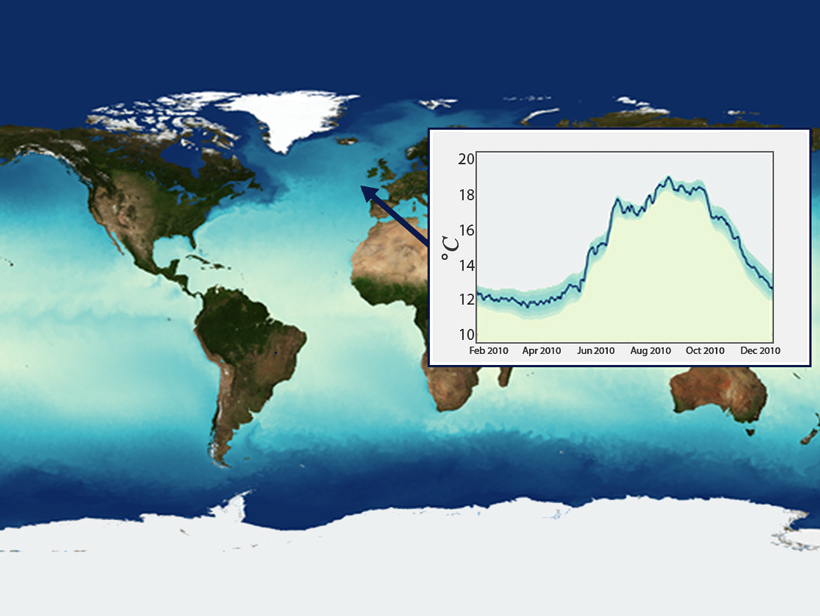A project on sea surface temperature is generating new climate data records from satellite observations. The data are independent of in situ observations and are harmonious across satellite sensors to maximize stability and have realistic, context-sensitive uncertainty estimates at all spatial and temporal scales.
The project, part of the European Space Agency Climate Change Initiative (SST CCI), now seeks to establish a useful method for communicating uncertainty in sea surface temperatures. This goal was the impetus for a workshop held in November 2014 in Exeter in the United Kingdom.
Participants’ backgrounds spanned a range of interests in weather and climate research. A key focus of the workshop was to clarify the distinction between error (mistakenness) and uncertainty (doubt). Uncertainty is typically quantified as the standard deviation of an estimated error distribution. However, errors in measurements from different effects have different correlations in space and time, so they cannot be expressed simply as a standard deviation.
Instrumental noise is usually modeled as independent random error between measurements. Calibration drift produces error that is highly correlated over global scales and years. Earth observation data sets will usually include errors on intermediate scales, which may be termed locally systematic. In the case of sea surface temperature, these are generally related to ambiguity from atmospheric variability and therefore correlate on synoptic scales. The current SST CCI approach is to specify components of uncertainty from random, locally systematic, and systematic effects separately.
In deriving uncertainty estimates across scales, these different components need to be propagated according to their correlation structure. Participants recommended that full characterization and clear documentation of the error model are needed and that these uncertainty components should be provided together with correlation information or that their complex behavior should be encapsulated in an ensemble as currently done by some providers of centennial-scale sea surface temperature data sets.
Because error covariance matrices can be large and difficult to use, workshop attendees recommended that these be parameterized to allow easy communication. The Climate Forecasting conventions—the community-accepted standards for providing metadata—require extension to accommodate more nuanced uncertainty information. Participants agreed that use of uncertainty information would be facilitated by providing tools for appropriate uncertainty propagation, ensemble selection, or the creation of user-defined flags.
Researchers do not necessarily use uncertainty estimates at face value, and trust in their realism has to be established. Workshop participants concluded that uncertainty validation and verification are welcomed, but more reference data are needed.
Participants noted that in addition to other factors, two major influences that govern how data are used are the scientific reputation of the producer and precedent of successful exploitation. Because precedent is persuasive, data producers may be able to promote uptake of products by engaging trailblazer users with their improved uncertainty information.
Attendees also felt that data producers need to address uncertainty estimation in a rigorous, defensible manner by defining uncertainty traceability chains. Tracing an uncertainty budget through processing levels from instrumental measurement to geophysical product can be based on metrological norms, e.g., from the Bureau International des Poids et Mesures’s guide to the expression of uncertainty in measurement.
Recommendations will be used to update the SST CCI user requirements document. A full report is available at the workshop’s website. The organizers thank all participants for their enthusiastic contributions.
—Nick A. Rayner, Met Office Hadley Centre, Exeter, U. K.; email: [email protected]; Christopher J. Merchant, Department of Meteorology, University of Reading, Reading, U. K.; and Gary K. Corlett, Earth Observation Science, Space Research Centre, Department of Physics and Astronomy, University of Leicester, Leicester, U. K.
Citation: Rayner, N. A., C. J. Merchant, and G. K. Corlett (2015), Communicating uncertainties in sea surface temperature, Eos, 96, doi:10.1029/2015EO030289. Published on 29 May 2015.
Text © 2015. The authors. CC BY-NC 3.0
Except where otherwise noted, images are subject to copyright. Any reuse without express permission from the copyright owner is prohibited.

